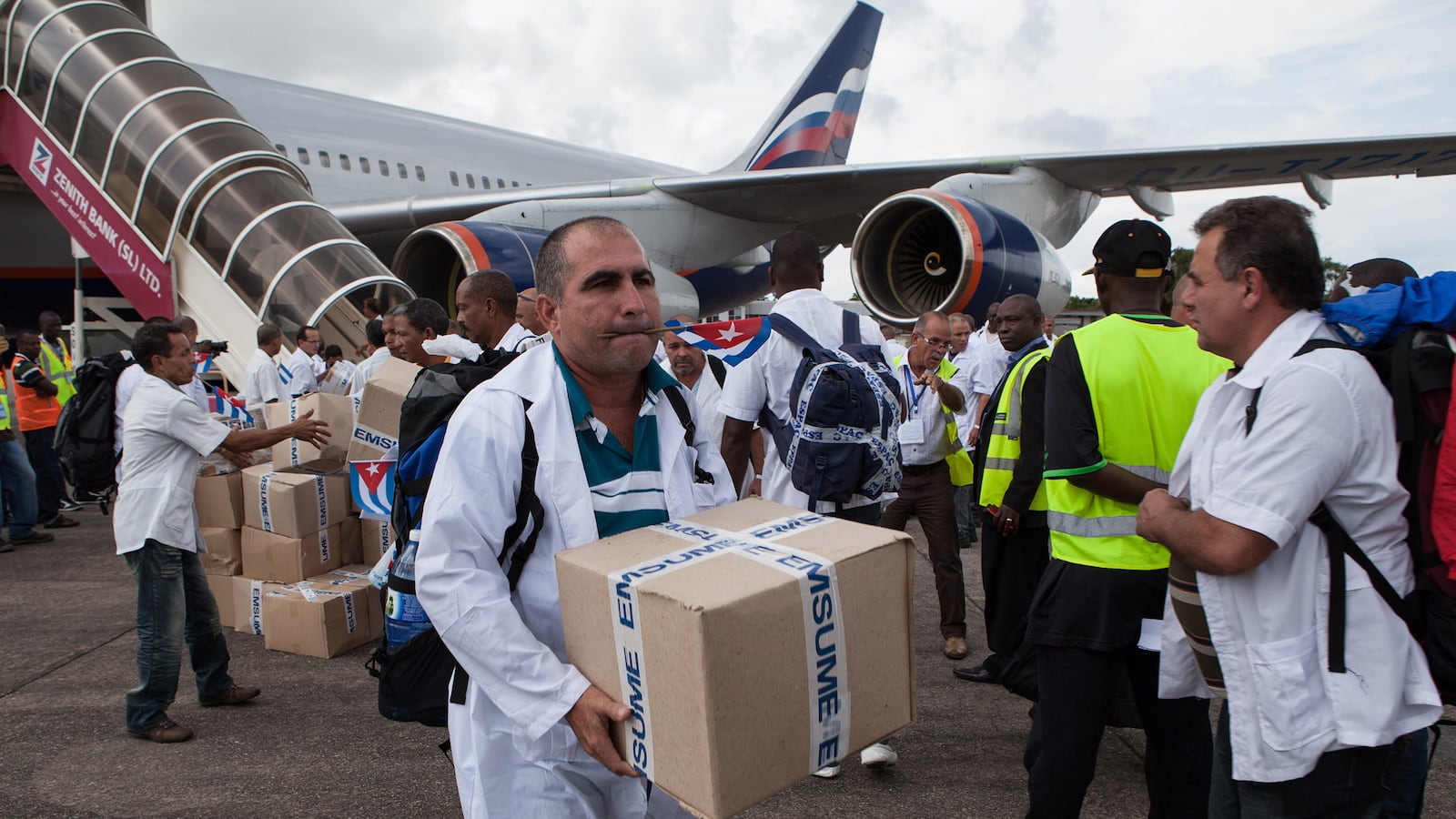If you ask most people what Cuba is famous for they probably will name two things: rum and cigars. But if you ask leftists what Cuba is famous for they will usually say something altogether different: healthcare and education.
Despite all the government oppression and poverty and the endless speeches by el líder maximo and his sibling, the Cuban healthcare and education systems are still held up as justification for the 1959 Cuban revolution in and of themselves.
So good is the healthcare system on the island supposed to be, and such is the abundance of skilled doctors, that Cuba can even afford to export medical personnel to disease- and crisis-stricken parts of the world in a gesture of international solidarity that the capitalist West does not begin to rival.
Estimates suggest that around 50,000 Cuban-trained health workers are spread across 66 countries, with many stationed in some of the poorest corners of the globe. In 2010 Cuba provided the largest contingent of medical staff during the aftermath of the huge earthquake that shook Haiti. Similarly, after an earthquake devastated Pakistan-administered Kashmir in 2005, there were more Cuban doctors on hand to aid the relief effort than there were medics from Pakistan proper. Who said socialist internationalism died in 1989?
And so today, during the current Ebola crisis, while the rich capitalist countries pontificate selfishly about things like anti-Ebola border security, socialist Cuba has again come to the rescue, flying in 461 health workers to stricken West Africa—more than any first-world country.
Even John Kerry, secretary of state in a country that has spent decades trying to oust the Castro clan, described Cuba’s contribution to the fight against the Ebola outbreak as “impressive.”
This penchant for medical internationalism goes back to the greatest icon of the revolution, Ernesto “Che” Guevara. He was a doctor and envisioned a world in which a medic would use “the technical knowledge of his profession in the service of the revolution and the people.”
Yet like Guevara’s socialism, Cuba’s fraternal medical altruism has a dark side. Che may have felt a genuine affinity with the poor, but he was also a fanatic who locked up homosexuals and other “deviants” in labor camps. He wanted to “bring justice to the downtrodden” but he wanted to do it by launching a first nuclear strike on New York or Washington. The Cuban government, still led by some of Che’s former contemporaries, exemplifies a similar contradiction between idealism and brutal coercion.
There is in fact a great deal more to the Castro brothers’ medical diplomacy than the development of Cuba as, in the words of gushing Guardian columnist, a “beacon of international humanitarianism.” The government in Havana rakes in around $8 billion a year on the backs of its health workers. Most notably it receives cheap oil from the Chavez/Maduro autocracy in Venezuela, but it also gets a hefty sum of much-needed hard currency from the World Health Organisation (WHO) for every doctor it sends to Africa and beyond.
Not that there is any shame in that: socialist economies need hard currency to buy things on the international markets as much as any other country. But if there’s altruism here, it’s on the part of the workers themselves, since they rarely see any of the money they bring in for the dictatorship back home. All the available evidence suggests that they receive a measly stipend from the regime—about $20 extra a month—with the rest pocketed by the government to bolster things like Cuba’s omnipresent security apparatus.
Yet lavish praise is heaped on the supposed generosity of Havana’s elderly rulers—the same ones who for 50 years have stopped most Cubans from travelling abroad. “Cuba is a special case,” says José Luis Di Fabio, who heads the World Health Organization’s Havana office, told DeutscheWelle. “The country has the ability to react very quickly because of the experience of the physicians and the political will to do so.”
“Political will” in this instance is a euphemism, for there is ample evidence to suggest that Cuba’s medical diplomacy is far from voluntary for those sent abroad on their country’s international missions. Much like those who decline to attend the “voluntary” pro-government rallies which sporadically fill the streets of Havana and give a veneer of democracy to the one-party state, those medics who choose not to play ball with the Leninist Center can pay a severe penalty. As Madrid-based Cuban doctor Antonio Guedes told the same German website, “Whoever does not cooperate may lose his job, or at least his position, or his son will not get a place at university.”
This jibes with something Yanelis Ochoa, a university medical student in Santiago de Cuba, told me when I visited the country in 2011. Talking about the future, Yanelis said that when she eventually graduates she “may have to go to Venezuela or Brazil for a short time to work.” What about your boyfriend? I asked. Are you not getting married soon? “James,” she replied with unusual gravity. “You don’t understand how these things work. If they say I go then I go. It’s that simple.”
Just as it sends its best doctors abroad while dilapidated hospitals struggle with outbreaks of dengue fever at home, Havana is happy to sacrifice the wellbeing of its citizens for international prestige and a large stipend from the WHO.
Cuban health workers flying out to West Africa have also been compelled to agree that, unlike medics from other countries, they will not be repatriated to Cuba to be with friends and family should they contract Ebola. Instead they must either be cured of the virus in one of the make-shift field hospitals or die, thousands of miles from home and away from loved ones.
This is not to pretend that rich nations have covered themselves in glory with their lethargic and solipsistic response to the Ebola crisis. They’ve done anything but; and there is something uplifting about people wanting to believe in the fraternal efforts of a plucky Caribbean island nation making a selfless sacrifice. Were the fairy-tale true it really would shame the affluent west.
Yet, as with so much in Cuba, under the seductive veneer of tropical socialism there exists a for-profit enterprise with Cubans as commodities to be bought and sold to fill the coffers of a Spartan dictatorship. As the Cuban revolutionary-turned-dissident Carlos Franqui once wrote: never confuse the stage-set Cuba with the reality that Cubans have to live in every day.






